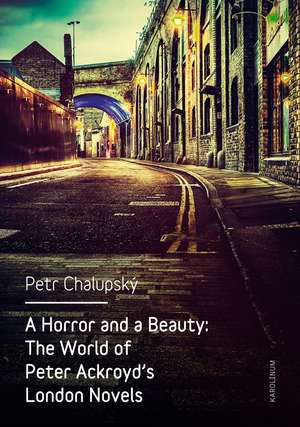A Horror and a Beauty: The World of Peter Ackroyd's London Novels
Autor Petr Chalupskýen Limba Engleză Paperback – 8 sep 2016
Peter Ackroyd’s writing is obsessed with the defining heterogeneity of London—its rich diversity of human experience, mood, and emotion, of actions and events, and of the tools through which all of this heterogeneity is represented and reenacted. But for Ackroyd, one of the foremost of the so-called “London writers,” this energizing heterogeneity also has a sinister side, largely originating outside social norms and mainstream pathways of cultural production. Touching on everything from occult practices to the plotting of radical groups, crime and fraud, dubious scientific experiments, and popular, dramatic forms of ritual and entertainment, Ackroyd contends that these forces both contest prescribed cultural modes and supply the city with its characteristic dynamism and capacity for spiritual renewal.
This idiosyncratic London construct is particularly prominent in Ackroyd’s novels, in which his ideas about the city’s nature and his connection to English literary sensibilities combine to create a distinct chronotope with its own spatial and temporal properties. A Horror and a Beauty explores this world through six defining aspects of the city as Ackroyd identifies them: the relationship between London’s past and present, its uncanny manifestations, its felonious tendencies, its inhabitants’ psychogeographic and antiquarian strategies, its theatricality, and its inherently literary character.
This idiosyncratic London construct is particularly prominent in Ackroyd’s novels, in which his ideas about the city’s nature and his connection to English literary sensibilities combine to create a distinct chronotope with its own spatial and temporal properties. A Horror and a Beauty explores this world through six defining aspects of the city as Ackroyd identifies them: the relationship between London’s past and present, its uncanny manifestations, its felonious tendencies, its inhabitants’ psychogeographic and antiquarian strategies, its theatricality, and its inherently literary character.
Preț: 100.42 lei
Preț vechi: 117.11 lei
-14% Nou
Puncte Express: 151
Preț estimativ în valută:
19.21€ • 20.06$ • 15.90£
19.21€ • 20.06$ • 15.90£
Carte indisponibilă temporar
Doresc să fiu notificat când acest titlu va fi disponibil:
Se trimite...
Preluare comenzi: 021 569.72.76
Specificații
ISBN-13: 9788024631615
ISBN-10: 802463161X
Pagini: 302
Dimensiuni: 152 x 203 x 18 mm
Greutate: 0.39 kg
Editura: Karolinum Press, Charles University
Colecția Karolinum Press, Charles University
ISBN-10: 802463161X
Pagini: 302
Dimensiuni: 152 x 203 x 18 mm
Greutate: 0.39 kg
Editura: Karolinum Press, Charles University
Colecția Karolinum Press, Charles University
Notă biografică
Petr Chalupský is the head of the Department of English Language and Literature in the Faculty of Education at Charles University, Prague. He is the author of The Postmodern City of Dreadful Night: The Image of the City in the Works of Martin Amis and Ian McEwan.
Cuprins
Cue-Titles
Introduction – Power, Majesty, Darkness, Shadows
Chapter 1 – Ackroyd’s London, Past and Present
London and the English Literary Sensibility
Ackroyd, History and the Historical Novel
Ackroyd’s London Chronotope
Chapter 2 – Uncanny London
London the Obscure
Wandering and Wondering in Eternity – Mythical Time
Where Suffering Seems to Linger – Genius Loci
Variety, Energy and Darkness – Cockney Visionaries
Poets of Power and Darkness – Ackroyd’s Occultists
The Divine Spark that never Dies, or Making the Dead Speak – the Magic of the Imagination
Chapter 3 – Felonious London
Serial Killings and the London Gothic Psychothriller
Crime Re-written
Assuming a Story – the Narrative of Detection
London Confined
Vivifying Crimes, Vivifying the City
Chapter 4 – Psychogeographic and Antiquarian London
Psychogeography
Ackroyd’s Psychogeographic Antiquarianism
Two Related Concepts
London of the Mind
Ackroyd’s Lonely Londoners
Ackroyd’s Walkers
Chapter 5 – Theatrical London
“Where pathos and pantomime meet”
London as a Stage and the Stage as London in Dan Leno and the Limehouse Golem
The Might and Glory of the City Celebrated – The Clerkenwell Tales
The Horrific, the Spectacular and the Sublime
Chapter 6 – Literary London
The Necessity of Imitation – the Counterfeiting and Metafictional London of Chatterton
When William Met Mary: London as a Palimpsest in The Lambs of London
Towards Autobiographic Self-referencing: Literary London in Three Brothers
Conclusion – Longing and Belonging
Summary
Bibliography
Index
Introduction – Power, Majesty, Darkness, Shadows
Chapter 1 – Ackroyd’s London, Past and Present
London and the English Literary Sensibility
Ackroyd, History and the Historical Novel
Ackroyd’s London Chronotope
Chapter 2 – Uncanny London
London the Obscure
Wandering and Wondering in Eternity – Mythical Time
Where Suffering Seems to Linger – Genius Loci
Variety, Energy and Darkness – Cockney Visionaries
Poets of Power and Darkness – Ackroyd’s Occultists
The Divine Spark that never Dies, or Making the Dead Speak – the Magic of the Imagination
Chapter 3 – Felonious London
Serial Killings and the London Gothic Psychothriller
Crime Re-written
Assuming a Story – the Narrative of Detection
London Confined
Vivifying Crimes, Vivifying the City
Chapter 4 – Psychogeographic and Antiquarian London
Psychogeography
Ackroyd’s Psychogeographic Antiquarianism
Two Related Concepts
London of the Mind
Ackroyd’s Lonely Londoners
Ackroyd’s Walkers
Chapter 5 – Theatrical London
“Where pathos and pantomime meet”
London as a Stage and the Stage as London in Dan Leno and the Limehouse Golem
The Might and Glory of the City Celebrated – The Clerkenwell Tales
The Horrific, the Spectacular and the Sublime
Chapter 6 – Literary London
The Necessity of Imitation – the Counterfeiting and Metafictional London of Chatterton
When William Met Mary: London as a Palimpsest in The Lambs of London
Towards Autobiographic Self-referencing: Literary London in Three Brothers
Conclusion – Longing and Belonging
Summary
Bibliography
Index
Recenzii
“A fine job indeed. Not only are Chalupský’s analyses apt and insightful but also the overall structure of the book does justice to Ackroyd’s multilayered fictional world. It is a book that deserves serious attention and should not be omitted in future discussions on Peter Ackroyd’s fiction.”
